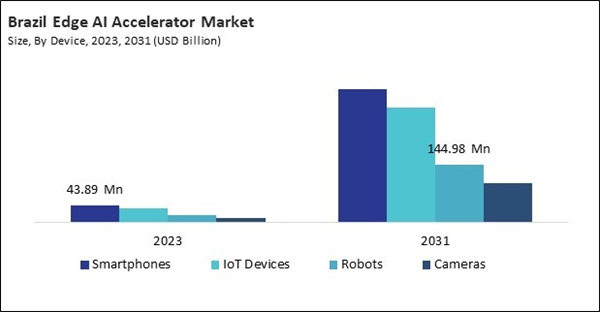The Brazil market dominated the LAMEA Edge AI Accelerator Market by country in 2023, and is expected to continue to be a dominant market till 2031; thereby, achieving a market value of $869 million by 2031. The Argentina market is exhibitng a CAGR of 32.4% during 2024-2031. Additionally, the UAE market is expected to experience a CAGR of 30.3% during 2024-2031.
The proliferation of IoT devices and smart systems is a key driver of adoption, as these technologies generate massive datasets that benefit from on-device processing. The compatibility of edge AI with emerging connectivity solutions, such as faster networks, further accelerates its uptake by enabling more sophisticated applications. As hardware becomes more accessible and software ecosystems mature, adoption is broadening across established industries and emerging markets, reflecting a growing consensus on the value of edge-based AI.
The push toward digital transformation fuels this trend as organizations seek to modernize operations and stay competitive. Companies are investing in edge AI accelerators to enhance automation, improve customer experience, and streamline processes, recognizing their role in future-proofing operations. The availability of tailored solutions - from compact chips for consumer devices to robust systems for industrial uses that adoption spans a wide range of use cases, cementing edge AI accelerators as a transformative technology across the board.
Brazil’s e-commerce sector, expected to exceed $200 billion by 2026 with an annual growth rate of 14.3%, is significantly contributing to the expansion of the market. The country’s growing digital economy is increasing the demand for AI-driven personalization, fraud detection, and real-time inventory management in e-commerce. With the rapid adoption of AI-enhanced customer experiences, such as voice assistants, recommendation engines, and chatbots, Edge AI accelerators are essential for reducing cloud dependency, enhancing response times, and improving transaction security. Furthermore, Brazil’s increasing investments in AI and data centers foster an ecosystem where Edge AI technologies can thrive, ensuring more efficient AI-powered services across the country’s digital commerce landscape. Hence, the growing focus on smart cities, IoT, AI, and digital commerce in the UAE, Saudi Arabia, and Brazil is accelerating the adoption of Edge AI accelerators.
List of Key Companies Profiled
- Apple, Inc.
- Google LLC (Alphabet Inc.)
- Huawei Technologies Co., Ltd. (Huawei Investment & Holding Co., Ltd.)
- Amazon Web Services, Inc. (Amazon.com, Inc.)
- IBM Corporation
- Intel Corporation
- NVIDIA Corporation
- Qualcomm Incorporated (Qualcomm Technologies, Inc.)
- AMBARELLA, INC.
- Microsoft Corporation
Market Report Segmentation
By Processor
- Central Processing Unit (CPU)
- Graphics Processing Unit (GPU)
- Application-Specific Integrated Circuits (ASICs)
- Other Processor
By Device
- Smartphones
- IoT Devices
- Robots
- Cameras
By End Use
- Automotive
- Healthcare
- Manufacturing
- Security & Surveillance
- Retail
- Other End Use
By Country
- Brazil
- Argentina
- UAE
- Saudi Arabia
- South Africa
- Nigeria
- Rest of LAMEA
Table of Contents
Companies Mentioned
- Apple, Inc.
- Google LLC (Alphabet Inc.)
- Huawei Technologies Co., Ltd. (Huawei Investment & Holding Co., Ltd.)
- Amazon Web Services, Inc. (Amazon.com, Inc.)
- IBM Corporation
- Intel Corporation
- NVIDIA Corporation
- Qualcomm Incorporated (Qualcomm Technologies, Inc.)
- AMBARELLA, INC.
- Microsoft Corporation









